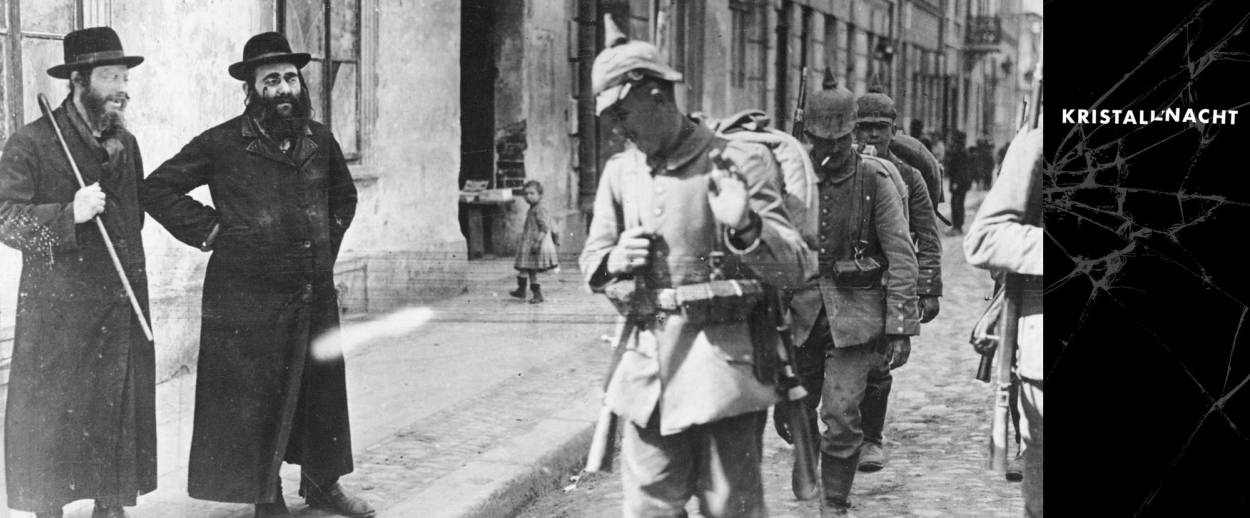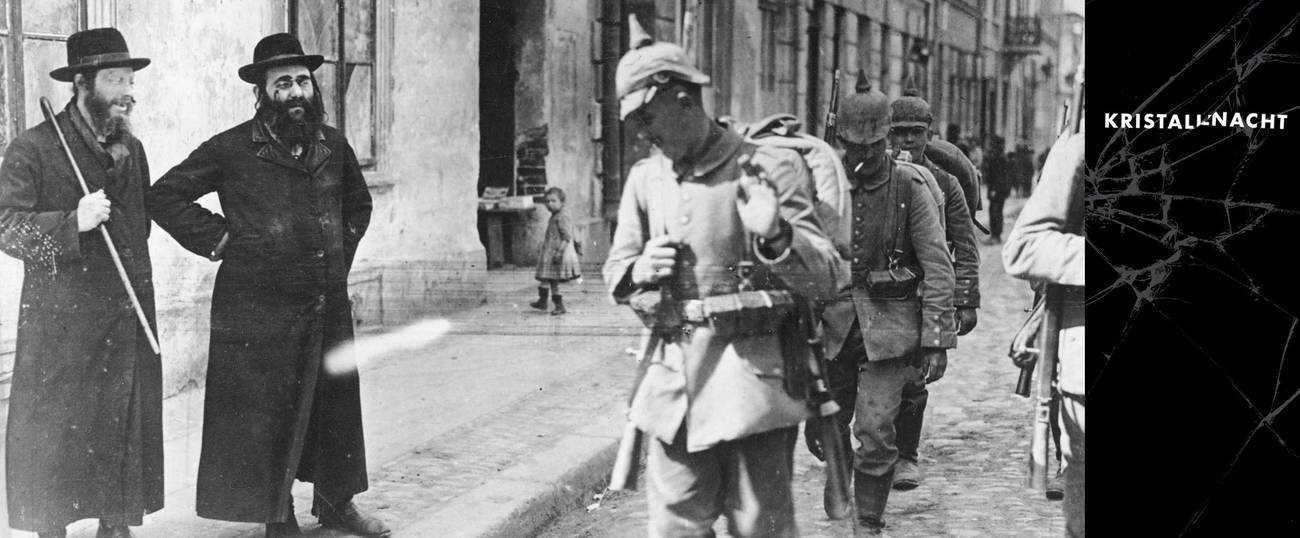“Once said to be lost, it was,” Charles Krauthammer wrote in 2004 in a New Republic article in which he fingered Walter Cronkite, “the voice of the establishment,” as the culprit behind America’s defeat in Vietnam. While the Vietnam stab-in-the-back argument is now largely dead, the idea persisted for decades that America could have won the war if only the military hadn’t had its hands tied by politicians, or the media hadn’t been so downbeat, or the hippies hadn’t turned the country into a clown circus. This notion was born from sheer bewilderment: America had never lost a war, the myth-making went, so someone, somewhere must have decided we weren’t going to win.
A similar bewilderment afflicted Germany at the end of World War I. The first stab-in-the-back story—Dolchstoss in German—happened when the German army returned home in defeat in November 1918. The reason for their surrender was obscure to many Germans: the enemy had never touched German soil, and both at the beginning and the end of the war—at least according to German newspapers—the Kaiser’s forces appeared to be winning. So there was only one possible explanation: Germany had been betrayed by Socialists and (you guessed it) Jews, 1918’s equivalent of the traitorous Sixties counterculture.
Historians have often remembered that right-wing Germans let their Jewish compatriots take the rap for Germany’s defeat and for the shame of Versailles’ punitive peace. They have been less inclined to remember that for most of the war German Jews and gentiles stood proudly together in defense of their country. Jews welcomed the war as a fight for justice, freedom and, most important of all, German culture.
Gertrud Kantorowicz wrote in August 1914, when the conflict broke out, that “the war itself is pure greatness … my being relates to Germany as a life’s breath relates to the body out of which it arises.” Gertrud was the cousin of the historian Ernst Kantorowicz, who earned the Iron Cross on the Western front and after the war joined the Freikorps, the right wing militia that battled Communists and Socialists in the streets of German cities. Both of them were Jews, and proud Germans.
Ernst and Gertrud Kantorowicz were typical of German Jews, Tim Grady demonstrates in his new book A Deadly Legacy: German Jews and the Great War. They were passionate nationalists, as völkisch as you could get. Like other Germans, they celebrated the outbreak of war as a momentous chance for national renewal. The late historian Fritz Stern remarked that the passionate German response to the war went beyond mere patriotism. Many intellectuals, especially, saw the guns of August as a triumphant release from dead-end bourgeois culture, a call to a new nobility and manliness.
In summer 1914, during the first frenzy of battle, even German Zionists declared that there was “no difference” between Jews and other Germans. Martin Buber wrote enthusiastically in August, “Never has the concept of the Volk been such a reality to me than during these last weeks.” The Jewish politician Ludwig Haas remarked that Russia, when it entered the war, had committed “the greatest crime in world history.” Never mind that Germany had in effect set off hostilities by giving a green light to Austria-Hungary’s attack on Serbia. Germans were eager to cast their fatherland as the victim of France, England and, most of all, Russia.
Russia had a deep meaning for Jews worldwide: it was their oppressor, their enemy. And so for many German Jews WWI became a holy war against Russia. The Zionist Jüdische Rundschau proclaimed that Germany was fighting “to free Russia and the world from unprecedented tyranny.” Jewish artists like Max Liebermann drew fierce caricatures of the bloodthirsty, slobbering Russian beast.
German Jews were prominent supporters of the army’s efforts to colonize the East. The territory won from Russia, they argued, properly belonged to Germany. Since the Ostjuden spoke Yiddish, a dialect of German, they were Germany’s racial compatriots.
Not that German Jewish soldiers felt a kinship with Russian Jews: the invaders were often appalled by the squalor of shtetl existence. These were exotic foreigners, alien to German Jewish culture. When refugee Jews from the East began flooding into Germany, Grady remarks, German Jews mostly recoiled from them instead of welcoming them with open arms. Grady quotes Victor Klemperer’s comment about eastern Jews: he did not “belong to these people,” Klemperer wrote: “I thanked my creator that I was German.” In spite of this cultural friction, Eastern Jews mostly welcomed the Germans who had delivered them from Russian rule.
When the Germans marched through Belgium in 1914, the Allies were quick to promote tales of German beastliness: the Belgian baby speared on a Hun’s bayonet was an image guaranteed to rouse indignation. One French journalist claimed that the Kaiser’s troops had cut off the hands of 4,000 children. Faced with such made-up atrocities, German Jews, like other Germans, leaped to the defense of their nation’s soldiers. They also went on the attack, inventing atrocities of their own. The Jewish writer Arnold Zweig published a short story about a Belgian farmer who cuts the throats of three peaceful German soldiers, then butchers them and feeds them to his pigs. In October 1914 the Jewish playwright Ludwig Fulda drafted a petition claiming that Germany had not destroyed “the life and property of a single Belgian citizen”; and he added, “We shall fight this war to the very end as a cultured people to whom the legacy of Goethe, Beethoven and Kant is as sacred as hearth and home.”
Fulda was mistaken in his defense of Germany’s soldiers. Although the German army didn’t cut off hands or shish-kebab babies, they did often murder Belgian prisoners and civilians, as the historian Max Hastings has shown. “How could [German soldiers] expect to be shot at from windows and cellars?” the Kölnische Zeitung asked in 1914, tacitly admitting that Germany had broken the rules of war. Out of self-defense the Kaiser’s troops had to “adopt punitive measures, burn houses, execute civilians,” the newspaper concluded.
In August 1914 the German army was riding high, and Berlin was convinced that the fighting would soon be over. Then came the stumbling block of the Marne in September, which stopped Germany’s advance and turned the war into an excruciating game of attrition. Now Germany was fighting on two fronts, cheated of its fantasy about quickly defeating France. The horrendous specter of trench warfare arose, and with it the desire for new weapons that would deal the enemy a decisive blow.
Grady recounts the well-known story of the German Jew Fritz Haber, the Nobel Prize winner and inventor of chemical weapons. Shortly after the Germans first used Haber’s chlorine gas in defiance of the Geneva Convention in April 1915, Haber’s wife committed suicide; undeterred, he traveled to the eastern front the next day to oversee more gas attacks. Haber’s godson Fritz Stern wrote that Haber was “German in every fibre of his being, in his restless, thorough striving … in his very soul and spirit.”
Unlike African-Americans in the American army, German Jews were integrated into their country’s forces, and anti-Jewish insults were rare. Grady writes that the Bavarian List regiment, “which counted fifty-nine German Jews as well as a young Adolf Hitler, showed few signs of harbouring any form of anti-Semitic spirit.” Rabbis served the religious needs of Germany’s Jewish soldiers and, military circumstances permitting, they were allowed to return home for Jewish holidays. Kaiser Wilhelm had decided that Jews could become officers, and so they did, though the higher-ups were sometimes reluctant to promote them.
But as the war ground relentlessly on, anti-Semitic rumors started circulating among the German people: Jews were shirkers, they were profiting from the war rather than fighting in it. The Wehrmacht gave in to the anti-Semitic canard with the census of November 1916, designed to find out how many Jews were serving at the front. The military insisted, implausibly, that the census had no anti-Semitic intent. Jews, who were fighting and dying for Germany like any other Germans, were disheartened.
Grady writes that Jewish and non-Jewish soldiers fought together on the German front lines with very little tension. But on the home front, the imaginary Jew was culpable for Germany’s loss.
In January 1918, strikes broke out across Germany; workers demanded peace, more food and more democracy. Two prominent Jews, Hugo Haase and Kurt Eisner, were among the leaders of the strikes. Afraid of a revolution like the Bolsheviks’ in Russia, the government quickly arrested the striking workers—and sent many of them to the front. In Berlin, flyers were handed around blaming the Jews for the uprising, though most Jews—and most soldiers—had little sympathy for the strikers. One Jewish newspaper, the Allgemeine Zeitung des Judentums, proclaimed that the strikers had “weaken[ed] the army’s military clout” and added that they were “stabbing the frontline army in the back.” Jewish writers, like other Germans, freely employed the fatal figure of speech.
The last gasp of Germany’s wartime ambition occurred in the spring of 1918. The treaty of Brest-Litovsk had awarded a huge chunk of Russian territory to Germany; the war in the East was over. In the West, German forces under General Ludendorff pushed the British and French armies back thirty-seven miles, but their advance cost half a million casualties. The French counterattacked in the summer, and by September the jig was up. Ludendorff, a broken man, admitted privately that “victory is out of the question,” but the German public still found defeat unimaginable. When news of the armistice broke in November, Joseph Levy, an orthodox Frankfurt cantor who led services in full military uniform, was like most Germans deeply shocked. The fatherland, he lamented, was “lost.” But who had lost it?
The main gift of Grady’s meticulously researched book is its lesson about how poisonous and long-lasting a stab-in-the-back legend can be, and what damage it can do to a country. In 1922 Weimar foreign minister Walter Rathenau, who had put Germany’s economy on a war footing in late 1914, was nicknamed “Gottverfluchte Judensau” (“goddamned Jewish pig”) and killed in the streets. Rathenau had just signed the Treaty of Rapallo with the Soviets, which gave up Germany’s land claims from WWI. A few years later, the idea of Jewish betrayal during and after the war paved the way for a political party that saw Jews as not merely traitors, but a poisonous, subhuman riff-raff.
Stern in his book about the intellectual roots of Nazism, The Politics of Cultural Despair, wrote that “No single idea played so powerful and so pernicious a role in postwar Germany as the notion that an undefeated army had voluntarily laid down its arms in the hope of a just peace. Because of it, Germans were able to feel that the Allies had tricked, not defeated them,” and that sinister elements of German society had aided this betrayal: “socialists, liberals, and Jews.”
The Weimar republic had been “fathered by traitors.” And so when the republic was swept away by the Nazis, Germans swallowed their reservations. They were certain that, whatever Hitler’s shortcomings, at least he would never double-cross them and lead their homeland to ruin.
Like this article? Sign up for our Daily Digest to get Tablet Magazine’s new content in your inbox each morning.

